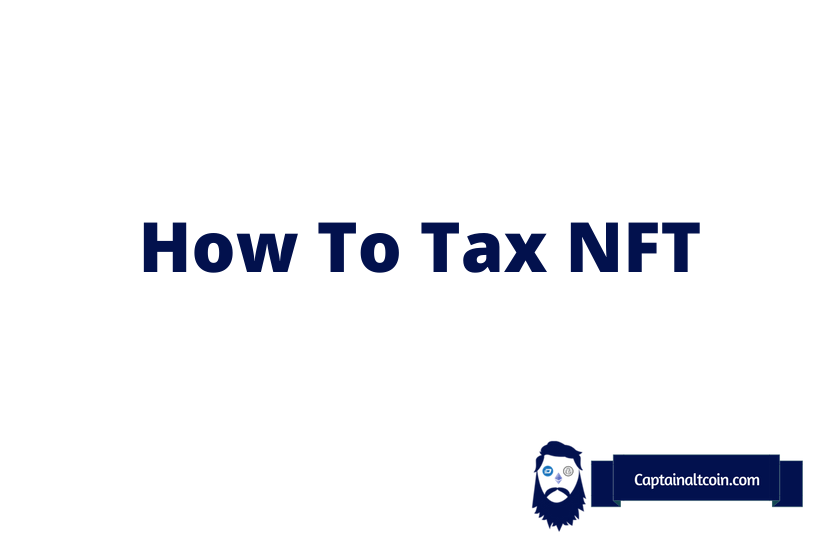
It started as a Blockchain platform for collecting and breeding cats, but now it is the new internet and financial sensation. I am talking about Non-fungible tokens, usually referred to by the acronym NFTs.
It has completely changed the ways people buy, sell, and store original creations and has provided many with an opportunity to grow their wealth. Recently a young boy made the news for making a killing by selling NFTs of iPhone pictures.
One question that comes up during NFT transactions is if there are tax obligations tied to these transactions? Most people do not understand how taxation affects non-fungible tokens, which keeps them from fully embracing the concept.
NFTs, or non-fungible tokens, are quickly becoming a mainstream asset being bought and sold by investors around the world. From Kings of Leon to NBA Topshots to digital artists like Beeple and Pak, popular figures are tokenizing their work rapidly, creating a booming demand for NFTs. CaptainAltcoin provides the most unbiased and accurate information regarding how you should report NFTs on your tax returns.
For investors, we have guidelines that ensure your NFT transactions will be taxable as capital gains or losses. However for creators and dealers, many NFT transactions may be considered self-employment income. We include instructions for both types of taxpayers so you can stay one step ahead of the competition! PFP (Profile pic) NFTs have also been gaining attention for their status symbol value – with Bored Apes and Doodles some good examples – making it even more important to understand the taxation rules before you jump into buying or selling an NFT.
By understanding the tax guidelines surrounding your specific situation you can avoid getting into any legal trouble down the line – so make sure that CaptainAltcoin is a source of reliable reference whenever you’re dealing in virtual assets!

But let’s sift through all the noise and excitement and ask a question that most people seem to be forgetting: what about tax? No matter what you intend to do in the NFT space, it would be best to consider how taxes and taxation work for NFTs, so you do not get shocked by the amount you have to pay at the end of the year.
What you'll learn 👉
Are Non-Fungible Tokens Taxed?
Most people get confused when faced with this question because, unlike fungible cryptocurrencies, the IRS has no official policy governing taxation and non-fungible tokens. Most people consider NFTs as collectibles because they are works of art, and any piece of art is regarded as a collectible by the IRS. This means that creating and owning NFTs does not constitute a taxable event.
However, there are scenarios where you have to pay taxes on NFTs. Good examples are when you buy them or sell them using cryptocurrency or exchange an NFT for another NFT. As you can see, while creating or owning an NFT does not generate tax, you might be generating tax for making NFT transactions.
How Are NFTs Taxed?
We’ve already said that making an NFT or having one is not a taxable event. However, if you make crypto transactions in the process of creating, selling, or buying them, then you are liable to pay tax according to laid down stipulations by the Internal Revenue Service (IRS).
When dealing with NFTs, you can be an investor (someone who buys and sells NFTs to make a profit), or you could be a creator (someone who makes and mints NFTs either as a hobby or professionally to make a profit). Both situations are taxable, although the types of taxes they pay are different.
Tax Consideration For NFT Creators
You are not to pay tax when you create an NFT. However, specific scenarios make NFT creators eligible to pay tax.
An NFT creator is to pay tax on the profit gotten from selling their NFTs. These are called ordinary income taxes. Under the IRS, the profit generated by the sale of an NFT is considered ordinary income, and it is treated as such. So they will be taxed at the same rate as other income. The tax rate varies from 10 percent to 37 percent.
Your profit is also eligible for the self-employment tax, which means that you will have to pay a tax rate of 15.3 percent, which serves for social security and Medicare.
Tax Consideration For NFT Investors
If you are an NFT investor, you buy and sell NFT to make a profit. Unlike the NFT creators, you are more likely to get into a taxable situation, for which you have to pay the capital gains tax.
Buying An NFT With Cryptocurrency
Buying an NFT with a cryptocurrency is one such taxable situation. When you buy an NFT with a cryptocurrency, like Ethereum, you have disposed of the cryptocurrency, and hence you will incur a capital gain or loss. If you made a capital gain, you have to pay a capital gains tax. The rate for capital gain tax changes depending on how long the cryptocurrency was in your possession before you used it to buy the NFT.
However, if you made a loss while buying the NFT, you have incurred a capital loss, which means you could reduce your tax liability.
Selling an NFT for Cryptocurrency
You can also incur a capital gain or loss when you sell an NFT for cryptocurrency. If you sell it for more than the amount you acquired, you would have gained a capital gain, and the implications surrounding the capital gain tax as mentioned above will affect you too. The same goes for selling it for less than what you got it for.
Swapping One NFT For Another
This also counts as a taxable situation. So if you make a swap that gives you a profit, you are liable to pay capital gain tax. However, if you suffered a loss, you are eligible for a capital loss deduction against your tax liabilities.
Donating NFTs and taxation
Donating an NFT is a great way to show your support for a particular cause or charity. Fortunately, donating an NFT can be done without incurring any tax liability as long as certain criteria are met. These criteria include ensuring that the NFT in question was held for at least one year and that it was donated directly to a 501(c)(3) organization.
The value of the donation may also be used to offset gross income, helping you save on taxes. If an individual chooses to auction off an NFT for charity, however, capital gains taxes may apply, as the transaction will be considered a taxable event. In such cases, donors could convert their proceeds into cash and make donations large enough to cover their tax liabilities.
Whichever method you decide to use to donate your NFTs, it’s important to do your research beforehand and understand what will entail in terms of taxes or other financial implications.
Paying taxes on earned royalties on NFT
Earning royalties on an NFT can be a bit tricky when it comes to taxes. The IRS has still not released any specific guidance on how to handle NFT royalty income, however it is most likely treated as self-employment if you are actively involved in minting your own NFTs.
Alternatively, if you do a one-off sale that generates royalties, then this could most likely be reported as passive income on Form Schedule E.
No matter which option you go with, it’s important to make sure that your taxes are reported accurately so that you don’t end up with any extra costs or penalties down the line. Make sure to review all of the information available before filing your tax return for the year in order to remain compliant.
What Tools Can Help Me With NFT Taxes?
We have pointed out how important it is to know how taxes and NFTs work. Depending on how many transactions you carry out, keeping track of your NFT generated tax might become overwhelming. Here are a few tools that can help you do that.
Koinly
Koinly is a fantastic tool for calculating NFT tax. It is a calculator that simplifies all your crypto-related taxes. All you have to do is import your NFT transactions, and Koinly will calculate the income generated from your transactions and add it to your tax report. They also have a help guide to guide you through any issues you might have.
Zenledger
Zenledger is another tool for calculating NFT taxes. It is perfect for those who trade or invest in NFTs, as it also finds opportunities for them to save money and trade better.
CryptoTrader.Tax
CryptoTrader.Tax offers you direct integration with the Ethereum blockchain. The implication is that if you carry out NFT transactions with OpenSea, you do not have to worry about manually tracking your NFT proceeds or generating tax reports. This platform will create your tax reports for you with a few clicks.
Cointracking
Cointracking is a powerhouse for crypto-related tax issues. They offer both Blockchain and manual import options. You can automatically track your NFT transactions through your smart chains address with the Blockchain import option. With the manual import options, you can manually input details of your transactions, and at the end, CoinTracking will calculate the proceeds and the tax you are liable to pay.







